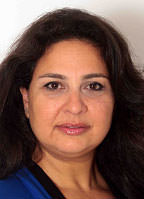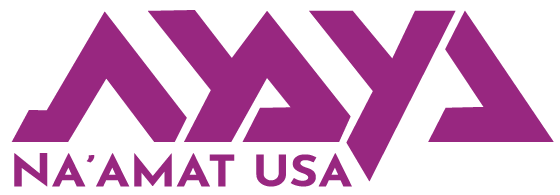Resusing to Give In To Fear
 For the past several weeks, Israel has been beset by an insidious form of violence. Terrorists, mostly Palestinian youth wielding knives, have carried out random attacks on ordinary people.
For the past several weeks, Israel has been beset by an insidious form of violence. Terrorists, mostly Palestinian youth wielding knives, have carried out random attacks on ordinary people.
The attacks have been centered in Jerusalem, but they have appeared all over the country. This past Tuesday, three Israelis were killed near Jabal Mukaber, an Arab neighborhood in Jerusalem. Police have responded with stepped up security measures.
NA’AMAT has not been unaffected by the violence. The teachers at its day care centers and schools are on edge, as are the children and families they serve. They, like the whole country, live in a climate of fear. NA’AMAT president Galia Wolloch spoke with NA’AMAT USA about the crisis, how the organization is responding and what you can do to help.
NA’AMAT USA: What is life like in Israel today?
Galia Wolloch: These are not easy days. We cannot say there is a safe place in Israel because no place is safer than any other. Terror attacks are happening all over the country. No one feels safe, not Arab people and not Jewish people. We are telling everyone in NA’AMAT to work together, to take care of each other.
NU: How has the violence affected you?
GW: I just returned from Pisgat Ze’ev, an area in Jerusalem that is very close to an Arab neighborhood. I visited two NA’AMAT day care centers. I spoke with the teachers because they are afraid. I wanted to hug them, to tell them to be strong. The teachers are all mothers themselves and worried about their own families. One teacher named Ya’el told me, “Galia, when I am in the day care center, I am not thinking about my family, I have to take care of the children here.” I came to tell them to be strong and they made me stronger.
I also met the parents. They talked to me about security at the day care center. Parents are asking about this all over Israel, not just in Jerusalem. There are electric gates at all of our day care centers. Anyone entering has to be let in by a member of the staff. But parents are now asking for security guards at the entrance to each school.[ultimate_spacer height=”15″][ultimate_spacer height=”15″]NU: Is that something you can do?
GW: It’s a problem because we don’t have the money. We are asking for funds from the government and from individual municipalities. Additional security will be provided on a limited basis in the morning and in the afternoon when children are arriving and departing at a few sites. But in most locations, there is no money for this. Unfortunately, we cannot afford to do it on our own.
NU: Parents are frightened.
GW: They are very frightened. Many of our workers are Arab women. Some parents are demanding that there no longer be any Arab teachers. They are Israeli Arabs who have been with us for a long time. They are part of the family of NA’AMAT.
NA’AMAT has always promoted coexistence. We don’t see any difference between Arabs and Jews. When I visit a day care center, I don’t know who is Jewish and who is Arab.
NU: There have been several periods of crisis during your tenure as president of NA’AMAT. How does the current situation compare with those of the past?
GW: In 2014,there was a war in Gaza. We were worried about bombs falling on our day care centers. This situation is different. You cannot take the children to a safe place. There is no safe place. This is not like a normal war. You never know when a person with a knife may appear. There are no alerts. You don’t know what to do about it. It’s something new and very frightening.
NU: NA’AMAT has worked hard to foster better understanding between people of different ethnicities and religions. Do events like this make you discouraged?
GW: No. I cannot allow that. That is why I went to Jerusalem today. I wanted to hug our teachers and tell them they are doing a very good job and that I trust them. We cannot allow ourselves to give up.
NU: What is the solution? What will end this cycle of conflict and violence?
GW: Ah…that is a very complicated question. NA’AMAT is for coexistence. We believe we have to talk, to negotiate. It is the only way. We are planning to hold a demonstration with Arab women and Jewish women. We have to live together. Our enemies in Gaza need also to understand that we need to negotiate.
NU: It must be hard to get people to listen to that message when they are afraid to walk the streets.
GW: Yes, people are afraid, but life goes on. People need to be more alert, but we must go on. We must continue as usual.
NU: What can people in the United States do to help?
GW: What we need now is money to pay for additional security. That would be most helpful.
[ultimate_spacer height=”15″][ultimate_spacer height=”15″]NU: What would you say to people in the United States to help them to better understand the situation in Israel?
GW: Today, I met a girl at a day care center. She was 8-years-old. She came with her mom to take care of her younger sister who is a year and a half. Her mother is deaf. This little girl told me she feels responsible now to be more alert. She told me that she was afraid to leave the day care center. She asked if she could stay a little longer. A small kid, eight years old and she feels responsible for her family, that the safety of her family is on her shoulders. It was very sad.
On the other hand, one of our workers, an Arab woman, was on a bus on her way to work in Tel Aviv. People shouted at her. She was attacked verbally. She was called names. She got off the bus and called us. She said, “I’m not coming to work today, I’m afraid.” Everyone is afraid. It is an impossible situation.
If you would like to help improve safety at NA’AMAT facilities in Israel, you can make a donation on our website at www.naamat.org or send it directly to our national office at:
NA’AMAT USA
21515 Vanowen St. Suite 102
Canoga Park,CA 91303
Please mark your donation as Emergency Fund.
Thank you, on behalf of the National Board.
